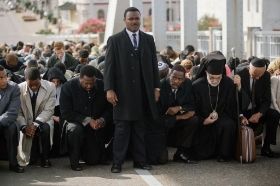 Historical dramas are tricky. They have to walk that fine line between fact and fiction, finding a way to communicate truths to the audience while hitting emotional and plot touchpoints true to their narrative story—not always an easy nor believable a task. The audience’s part to play in this is agreeing to the conceit that there is a difference between a historical drama and a documentary and when they buy a ticket to see a fictionalized story based on true events, they are agreeing that it is, in fact, only based on true events, not the real events as they actually happened. Film is a creative endeavor, an interpretive art form, and interpretations of history are not uncommon in cinema. It is how we react, embrace and interpret these interpretations for ourselves that matter—and how we allow them to reflect upon ourselves and our own history that tell the true story.
Historical dramas are tricky. They have to walk that fine line between fact and fiction, finding a way to communicate truths to the audience while hitting emotional and plot touchpoints true to their narrative story—not always an easy nor believable a task. The audience’s part to play in this is agreeing to the conceit that there is a difference between a historical drama and a documentary and when they buy a ticket to see a fictionalized story based on true events, they are agreeing that it is, in fact, only based on true events, not the real events as they actually happened. Film is a creative endeavor, an interpretive art form, and interpretations of history are not uncommon in cinema. It is how we react, embrace and interpret these interpretations for ourselves that matter—and how we allow them to reflect upon ourselves and our own history that tell the true story.
The producers of Selma had no way of knowing the prophetic timing the release of their movie would have. To come out and be getting significant critical acclaim and awards buzz (even though it won’t be released to a wide audience until January 9) right after the racially-charged incidents in Ferguson, Missouri and New York City only makes the subject matter and the impact of the film all the more powerful, effective, timely and haunting. And, to be honest, that is exactly what a well-made historical drama should do: it should remind ourselves of history and, no matter when the real events may have taken place, how that history has colored, shaped and crafted our world—and, always, how doomed we are to repeat it if we don’t pay attention.
Selma is a most powerful reminder of what this country’s history is and how far we haven’t come, almost more so than last year’s sober, graphic and tragic Best Picture winner 12 Years A Slave. Selma covers much more recent history, as it focuses on the year 1965, as Martin Luther King Jr’s campaign for voting rights in Alabama became a key part of the civil rights movement, highlighted by the march from Selma to Montgomery. While Selma zooms its lens in specifically, plot-wise, on the logistics of putting on the march, the scope of this film is much wider, as it examines the state of the country, from the state of mind of President Johnson, played nicely by Tom Wilkinson, all the way to the determination of the maids and students who became key parts of the movement. Director Ava DuVernay and writer Paul Webb do a great job steering the course through several clumsy obstacles, including a courtroom sequence and the obligatory speeches that sometimes feel thrown in, when the movie clearly works best when it’s at its most intimate, specifically featuring King himself, played remarkably by David Oyelowo, and his entourage. Getting to know him and the people around him—the people behind the movement—is the heart and soul of the movie and when it really works best. All the newsreel stuff—the moments, the marches, the conflicts—these may be what really happened, but it’s not what drives the movie. Which is why it’s a drama and not a documentary—and why it’s so good.
Sadly, what also helps to drive the movie, at least emotionally, is how painfully familiar it feels. Fifty years later and it feels like there are moments when nothing has changed. Isn’t the point of art to illuminate? To question? To prompt dialogue? Selma should be seen as more than a bio-pic or a story about a place in time or a moment in history. It should be seen as a mirror, a reflection of who we are as a country, as a society, and we should not look away. Our history cannot and should not be ignored, no matter how it is interpreted, it deserves to be recognized and we need to keep asking ourselves, “what now?”
